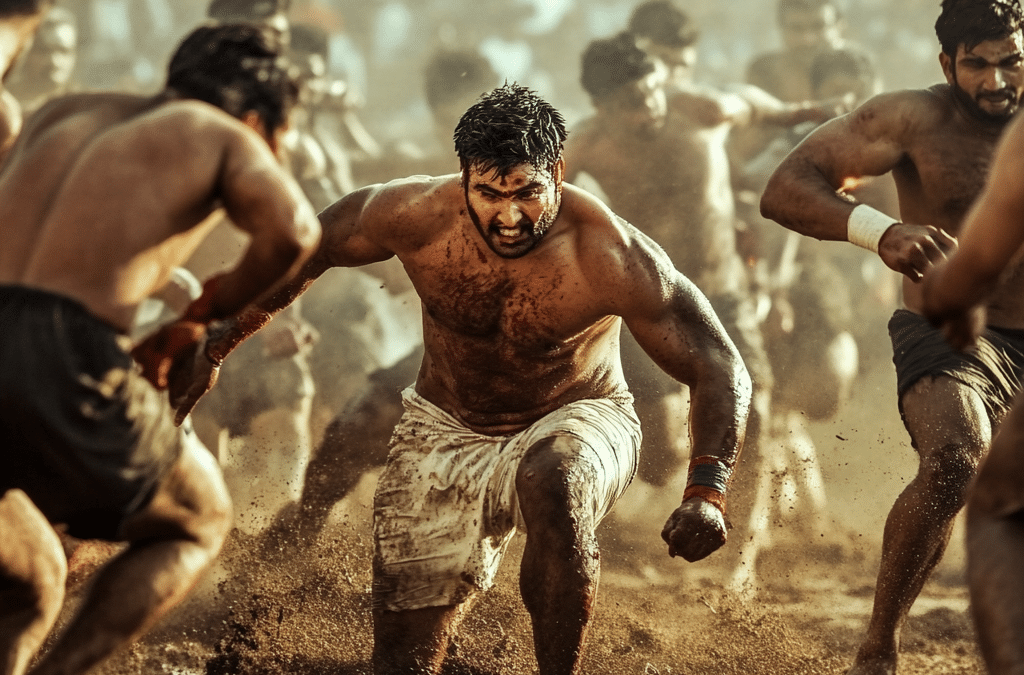Kabaddi is a contact team sport involving two teams, each with seven players, with its origins tracing back to ancient India. The game’s aim is for a single offensive player, known as the “raider”, to enter the opponent’s half of the court, tag as many opponents as possible, and return to their side of the court, all within 30 seconds, without being tackled by the defending players. Points are awarded for each opponent tagged by the raider, while the opposing team scores a point if they manage to stop the raider. Players are temporarily removed from the game if they are tagged or tackled, but can re-enter after their team scores a point through a tag or tackle.
Kabaddi enjoys popularity in the Indian subcontinent and other Asian countries nearby. Historical records mention Kabaddi in ancient Indian history, but it gained widespread popularity as a competitive sport in the 20th century. It is recognized as the national sport of Bangladesh and ranks as the second most popular and watched sport in India, following cricket. It also holds the status of the state game in several Indian states, including Andhra Pradesh, Bihar, Chhattisgarh, Haryana, Karnataka, Kerala, Maharashtra, Odisha, Punjab, Tamil Nadu, Telangana, and Uttar Pradesh.
There are two primary forms of the game: “Punjabi kabaddi”, also known as “circle style”, which is played outdoors on a circular field in traditional forms, and the “standard style”, which is played on a rectangular court indoors. The latter is featured in major professional leagues and international competitions, such as the Asian Games.
The game is known by various names across the Indian subcontinent, including kabaddi or chedugudu in Andhra Pradesh and Telangana; kabaddi in Maharashtra, Karnataka, and Kerala; kabaddi, komonti, or ha-du-du in West Bengal and Bangladesh; baibalaa in the Maldives; kauddi or kabaddi in the Punjab region; hu-tu-tu in Western India; ha-do-do in Eastern India; chadakudu in South India; kapardi in Nepal; kabadi or sadugudu in Tamil Nadu; and chakgudu in Sri Lanka.
Name
The raider must carry out each raid on a single breath; to demonstrate that they are not breathing in during the raid, they must continuously chant the word “kabaddi”, a practice known as canting.
Kabaddi stands among the numerous traditional Tamil sports that have been played by the Tamil people for an extended period. In preparation for competitions (both attacking and defending), Tamil individuals participate in significant training sessions referred to as Kabaddi. The name “Kabaddi” itself is derived from Tamil, suggesting it is a term of Tamil origin. Specifically, it combines “Kai” (hand) + “Pidi” (grab) to form Kabaddi.
History
Ancient Era
The origins of Kabaddi are shrouded in mystery, with various theories regarding its inception and development. It is believed that the sport has been prevalent in the Indian subcontinent since prehistoric times. Rononjoy Sen, in his book “Nation At Play,” suggests that Kabaddi may have originated during the Vedic period, which spans from 1500 BC to 500 BC. Historical accounts even mention Gautama Buddha and Lord Krishna participating in an ancient form of the sport.
Another narrative proposes that Kabaddi originated in Tamil Nadu, being a common activity among the Ayar tribal people in the ancient Tamil Nadu’s Mullai region. Additionally, there are mentions of Kabaddi being played in Iran around 2,000 years ago.
Modern Era
The modern iteration of Kabaddi represents a unification of the game played under various names across the Indian subcontinent. India played a pivotal role in promoting Kabaddi as a competitive sport, starting with organized competitions in the 1920s, its inclusion in the Indian Olympic Games in 1938, the founding of the All-India Kabaddi Federation in 1950, and its demonstration at the first Asian Games in New Delhi in 1951. These milestones contributed to the formalization of the sport, transitioning it from muddy village grounds to legitimate international platforms.
The first set of rules for Kabaddi was established in Maharashtra in the 1920s, taking inspiration from English sports for its formal structure. The All India Kabaddi Tournament in 1923, one of the earliest modern tournaments, adhered to these revised rules. After being showcased again at the 1982 Asian Games in Delhi, Kabaddi was officially included in the Asian Games starting in 1990.
The launch of the Pro Kabaddi League (PKL) in 2014 marked a significant evolution in the standard style of Kabaddi, introducing various rule changes. For instance, while raids previously had no time restrictions, the PKL introduced a standard 30-second time limit for each raid, revolutionizing the sport.





